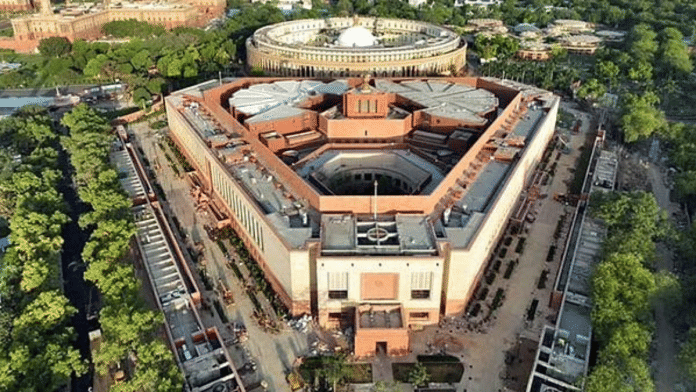Thank you dear subscribers, we are overwhelmed with your response.
Your Turn is a unique section from ThePrint featuring points of view from its subscribers. If you are a subscriber, have a point of view, please send it to us. If not, do subscribe here: https://theprint.in/subscribe/
“Give them bread and circuses and they will never revolt.” The phrase, attributed to the Roman satirist Juvenal, carries a chilling relevance in contemporary India. In a time of growing inequality, democratic fatigue and institutional decline, the promise of spectacle, whether through symbolic gestures, mass rallies or media orchestration, has replaced the need for meaningful governance. As long as citizens are offered superficial satisfaction, their deeper demands for justice, representation and rights are suppressed or delayed. The machinery of statecraft no longer depends on public reasoning but on public distraction.
In the world’s largest democracy, the ideal of collective governance is slowly being eclipsed by an obsession with individual power. A new political culture has emerged that thrives not on dialogue but on devotion, not on accountability but adulation. At the heart of this culture lies the cult of Hero Worship, a phenomenon that, in religion, may lead to spiritual salvation, but in politics, it inevitably paves the way for authoritarian rule. The leader is no longer viewed as a fallible representative within a constitutional framework but as the unquestionable embodiment of the nation itself. What was once a representative democracy now flirts dangerously with the idea of a singular voice standing in for the entire polity, reducing the complexities of governance to the will and persona of one individual and thereby eroding the very foundations of democratic accountability.
This shift finds echoes in Plato’s warning about democracies that collapse into tyranny through the rise of demagogues. These are leaders who speak the language of the people but work solely to secure their own dominance. Their promises appeal to emotion, not reason and their governance, though cloaked in popular support, often undermines constitutional morality and serves narrow interests rather than the common good. Increasingly, decisions are taken through methods that sidestep constitutional principles, relying instead on executive dominance and extra-parliamentary means that weaken the spirit of democratic accountability. The overuse of ordinances, a practice meant for legislative urgency, has turned into a tool for avoiding parliamentary debate. Critical decisions that impact the constitutional fabric of the country are pushed through with minimal consultation and transparency.
The abrogation of Article 370 in 2019 marked a turning point in India’s federal structure. The decision, taken unilaterally and without the consent of the Jammu and Kashmir state legislature or its people, was enforced under extraordinary restrictions. Communication was blocked, elected leaders were detained and civilian dissent was criminalized. The move signaled not just a policy shift but a fundamental alteration in the relationship between the Union and its states, leaning towards an increasingly unitary model of governance. The manner in which Article 370 was revoked, bypassing democratic processes and silencing local stakeholders, raised serious concerns about the erosion of constitutional values, especially the principle of cooperative federalism.
Parallel to this has been the erosion of civil liberties under the guise of security and reform. Colonial-era legal frameworks like the Indian Penal Code (IPC), the Criminal Procedure Code (CrPC) and the Indian Evidence Act, which needed serious reform for decades, were instead overhauled and renamed without adequate public deliberation. The introduction of the Bharatiya Nyaya Sanhita, Bharatiya Nagarik Suraksha Sanhita and Bharatiya Sakshya Adhiniyam Bill signals more than cosmetic change. Critics fear these laws may further empower the state at the cost of individual rights, especially when dissent is easily framed as sedition or anti-nationalism.
The promise of development has also come under scrutiny. Neoliberal policies, though long defended as engines of economic growth, have deepened inequalities. The benefits of liberalization remain largely concentrated among corporate elites and upper-middle classes, while inflation, unemployment and precarious livelihoods have tightened their grip on the working and lower-income populations. India’s Economic Survey 2024-25 offers an optimistic picture that sharply contrasts with ground realities. For a vast section of the population, “growth” is an abstraction; survival remains the daily struggle.
Karl Marx’s division between the Bourgeoisie and the Proletariat offers a useful lens to critique this economic duality. As state policy aligns increasingly with corporate interests from tax reliefs to privatization drives, the working masses are left to grapple with stagnant wages, shrinking welfare and job insecurity. The Global Hunger Index 2023 ranked India 111 out of 125 countries, which is an alarming reflection of nutritional deprivation and systemic neglect. Yet, such reports are often dismissed as foreign conspiracies, while domestic concerns are buried under the weight of spectacle-driven politics.
The space for dissent in India is narrowing. Democratic institutions, once robust with debate and resistance, now appear compromised or subdued. Media houses often toe the official line. Civil society voices face intimidation. And an emboldened majoritarian sentiment has allowed religious polarization to become normalized, fuelling hate while silencing empathy.
To critique such developments is not to oppose the nation, but to defend its founding principles of pluralism, justice and equality. Ignoring signs of democratic erosion risks an unrecognizable tomorrow. India’s soul rests in its diversity, debate and dignity. This moment demands reflection over applause. Silence, after all, has a price.
These pieces are being published as they have been received – they have not been edited/fact-checked by ThePrint.


